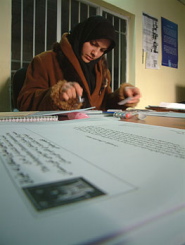
Seventy-two-year-old Um Kadhim said she wasn’t going to let the aches and pains of old age keep her from voting in Iraq’s landmark elections.
“I’ve come here so that all the world can see on television that we want elections,” said the Nassriyah resident, adding she’d be voting for the United Iraqi Alliance, a coalition which includes the main Shia parties as well as smaller groups.
The Alliance was set up with the blessing of Iraq’s supreme Shia cleric, Grand Ayatollah Ali al-Sistani. The ayatollah’s reputation is good enough for Um Kadhim, who told IWPR she was going for the bloc specifically because it was “endorsed by the marjaiya”, the Shia clerical leadership.
Although he supported the creation of the United Iraqi Alliance, Sistani abstained from backing specific political groups during the campaign. However, on January 28, a spokesman for his office in Basra, Ali Abdul-Hakim al-Safi, quoted the ayatollah as saying voters should go for the Alliance.
Um Kadhim’s her granddaughter, Fatima al-Saadi, a 22-year-old student, was of a different mind. She said she’d be putting her mark next to the Assembly of Independent Democrats, led by veteran Sunni politician Adnan Pachachi, because the candidates it was fielding had the right kind of expertise in building and reconstruction.
When asked why she wasn’t going for the United Iraqi Alliance, Fatima said, “I think the marjaiya wants us to take part and to vote for any list we like – it hasn’t imposed any specific list.”
Fatima’s father Kadhim, meanwhile, voted for Prime Minister Ayad Allawi’s Iraqi List, saying he believed Allawi would be able to impose law and order.
The different visions of the future held by three generations of one family are not unusual in this part of Iraq.
Iraq’s Shia majority, who make up some 60 per cent of the country’s population, see the election as a chance to win power after years of oppression and exclusion.
The national election was for a 275-member transitional National Assembly, which is charged with writing a new constitution. Each party will win seats in the assembly based on the percentage of votes their party received on election day, with Iraq taken as one big constituency. Provincial elections for governorate councils are being held at the same time, as is a vote in the Kurdish north for a regional election.
Before the election, analysts predicted that Shia voters would largely back the United Iraqi Alliance. But on the day, Shia voters expressed a variety of opinions.
Diwaniyah resident Fakhriya Habeeb said she was voting for the Iraqi Communist Party. “I’ve come here to give my vote for the one who deserves it,” she said.
Others made their choice based on the personality of a particular candidate.
Mustafa Basim, a student at the University of Qadisiyah, in Diwaniyah, said he believed Prime Minister Allawi was the kind of strong leader Iraq needed in the future.
“He’s firm, and he has adopted a heavy-handed style towards those who disobey,” he said. “That’s the kind of person we need.”
In Shia areas, some people said they were backing Allawi because they believed he played a key role in subduing Muqtada al-Sadr, the radical Shia cleric who led two uprisings against the Coalition and the interim government last year.
“Ayad Allawi helped us get rid of Muqtada al-Sadr’s tyranny. That man [Sadr] is a hard-liner, and he destroyed our city,” said Hasan Ali, an engineer in Qadisiyah.
Among United Iraqi Alliance voters, some – though not all – were prompted by the perception that it was the clerical establishment’s favourite.
Civil servant Hayder al-Khashan said he “responded to the call of the marjaiya” and voted for the bloc, but he admitted that a part of him didn’t want to, “I wish I could have voted for Ayad Allawi’s list, but this [Alliance] is the opinion of the marjaiya.”
Others said they were attracted by the fact that the Alliance includes secular Shia candidates such as Ahmed Chalabi, formerly a leading émigré politician.
“Chalabi deserves to be elected because he called for de-Baathification, [a move] against the Baath party which destroyed us and our country,” said Furqan Faisal, a professor at Qadisiyah University. “Now we’re showing our gratitude by voting for him.”
This article was first published on 30 January 2005 (ICR No. 106) by the Institute for War & Peace Reporting (IWPR), London. Posted on Religioscope with permission.
Articles published by the IWPR on Afghanistan, Central Asia, the Balkans, the Caucasus, Iraq as well as other topics can be accessed on its website: www.iwpr.net